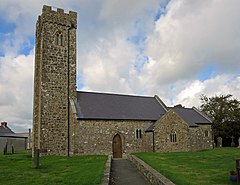Johnston, Pembrokeshire
| Johnston | |
|---|---|
 St Peter's Church |
|
| Johnston shown within Pembrokeshire | |
| Population | 1,941 (2011 census) |
| OS grid reference | SM932104 |
| Principal area | |
| Ceremonial county | |
| Country | Wales |
| Sovereign state | United Kingdom |
| Post town | HAVERFORDWEST |
| Postcode district | SA62 |
| Dialling code | 01437 |
| Police | Dyfed-Powys |
| Fire | Mid and West Wales |
| Ambulance | Welsh |
| EU Parliament | Wales |
| UK Parliament | |
| Welsh Assembly | |
Johnston is a community in the hundred of Roose, Pembrokeshire, Wales, and a parish in the diocese of Diocese of St David's.
It lies on the A4076 road approximately midway between Haverfordwest and the port of Milford Haven and is served by Johnston railway station. Until the end of the 19th century, anthracite was mined here. The village is now a dormitory for Haverfordwest and Milford Haven. The parish church has the typical tall, slim castellated tower of churches in English-speaking Little England beyond Wales.
In 2011 11.4% of inhabitants could speak Welsh, down from 13.81% in 2001, but 18.5% had at least some Welsh language ability. This is lower than the overall percentage for Pembokeshire and Wales, which are 19.2 and 19.0 respectively.
The village is just over 1 mile long and almost a mile wide from the furthest main points.
Johnston was founded as a small farming and mining village sometime before 1801 when 99 people lived in the village. Maps from 1579 show Johnston as an already established village. The population steadily grew to 600 in 1951 and almost doubled in the next 10 years to 1133. Since then Johnston has had a steady population growth.
Johnston is not an ethnically diverse village with 99.55% of the population identifying as White. It is also a majority Christian village with 62.4% of people identifying as a Christian, 0.2% as a Buddhist, 0.4% as a Muslim, 0.5 as Other and 26.5% as No Religion. 9.7% of people did not state a religion.
The majority of people, 72.8%, were born in Wales. 23.5% of other people were born elsewhere in the United Kingdom (22% were born in England, 1.3% in Scotland and 0.2% in Northern Ireland). 0.3% were born in Ireland. 1.2% of people were born in countries that were members of the EU before 2001 while 0.4 were born in EU countries that joined after 2001. 1.9% were born in 'other countries'.
...
Wikipedia

